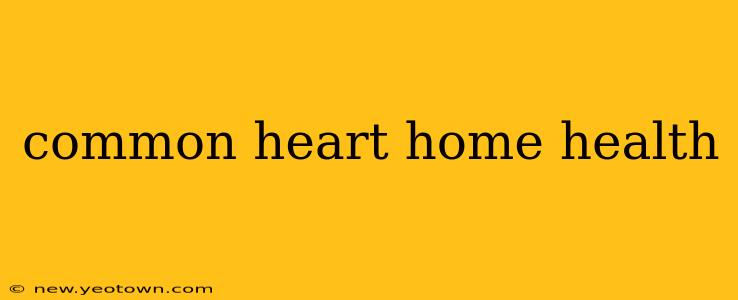Heart disease is a leading cause of death worldwide, and while advancements in medical technology have dramatically improved treatment options, many individuals still require ongoing care after hospitalization. This is where home health care plays a crucial role, providing essential support and monitoring to help patients recover and manage their conditions effectively. This article delves into the common aspects of heart home health, addressing frequently asked questions and offering insights into this vital area of healthcare.
What is Heart Home Health Care?
Heart home health care encompasses a range of services delivered in the comfort of a patient's home, focusing on managing and improving cardiac health. These services are tailored to individual needs and often include skilled nursing visits, medication management education, cardiac rehabilitation exercises, dietary counseling, and regular monitoring of vital signs like blood pressure and heart rate. Imagine it like this: instead of repeatedly traveling to the hospital or clinic, your dedicated healthcare team comes directly to you, ensuring consistent and personalized support. This approach promotes faster recovery, reduces hospital readmissions, and improves overall quality of life.
What are the common conditions treated with Heart Home Health Care?
Many cardiac conditions benefit from the personalized attention of home health care. Some of the most common include:
- Congestive Heart Failure (CHF): Home health nurses regularly monitor fluid balance, educate patients on medication management, and provide support to manage symptoms like shortness of breath.
- Coronary Artery Disease (CAD): Post-procedure care, including wound care, medication education, and activity modification guidance, are key components of home health care for CAD patients.
- Post-Myocardial Infarction (MI) Care: Following a heart attack, home health care helps patients regain strength, manage medication, and adopt lifestyle changes to prevent future cardiac events.
- Arrhythmias: Regular monitoring of heart rhythm, medication adjustments as needed, and education on managing symptoms are often provided.
- Valve Disease: Post-surgical care and ongoing monitoring of symptoms are critical components for patients with valve disease.
What types of services are typically included in heart home health care?
The specific services provided depend on the individual patient’s needs and medical condition. However, some common services include:
- Skilled Nursing: Registered nurses assess the patient's condition, administer medications, monitor vital signs, educate the patient and family, and coordinate care with other healthcare providers.
- Physical Therapy: Tailored exercises help improve strength, endurance, and mobility, aiding in the recovery process.
- Occupational Therapy: Focuses on adapting daily activities to accommodate the patient’s physical limitations and promote independence.
- Speech Therapy: In cases of cardiac-related speech difficulties.
- Medical Social Work: Provides emotional support, helps access community resources, and assists with navigating the healthcare system.
How is heart home health care different from other types of home health care?
While home health care addresses various health conditions, heart home health care has a specific focus on cardiac health. The expertise of the healthcare team is specifically geared towards managing cardiac conditions, ensuring appropriate medication management, monitoring vital signs relevant to cardiac function, and implementing cardiac rehabilitation programs. The care plan is built around managing the specific challenges associated with heart disease.
How do I find a heart home health care provider?
Finding the right provider starts with your doctor or hospital discharge planner. They can recommend reputable agencies with experience in cardiac care. You can also search online for agencies specializing in home health care and verify their credentials through state licensing boards and accrediting organizations. Always ask about their experience with heart conditions and the qualifications of their healthcare professionals.
What are the benefits of heart home health care?
The benefits extend beyond convenience:
- Improved Patient Outcomes: Consistent monitoring and personalized care lead to better management of cardiac conditions.
- Reduced Hospital Readmissions: Proactive intervention and education minimize the risk of complications requiring hospital readmission.
- Enhanced Quality of Life: Receiving care at home promotes comfort, independence, and a faster recovery.
- Cost-Effectiveness: In the long run, preventing hospital readmissions can significantly lower healthcare costs.
Receiving heart home health care doesn't signal the end of the road; it marks the beginning of a journey toward better health management, offering support and resources to navigate the challenges of living with heart conditions. The focus is on empowering patients to regain their strength, manage their condition effectively, and live fulfilling lives.

